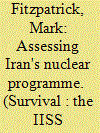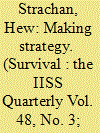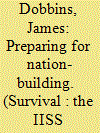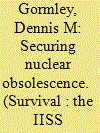| Srl | Item |
| 1 |
ID:
072901


|
|
|
|
|
| Publication |
2006.
|
| Summary/Abstract |
The many indicators of military involvement in Iran's nuclear programme strongly suggest that Iran seeks more than just a latent nuclear-weapons capability, although not necessarily an all-out Manhattan Project-style effort. Depending on assumptions about technical variables, the earliest Iran might be able to produce enough highly enriched uranium for a nuclear weapon is assessed to fall between the end of 2008 and 2010, a range that might be said to be within the margin of error, given the unknowns about the pro gramme and the inspectors' sharply decreased access. This timetable provides room for diplomacy. There are strong arguments, with universal appeal, for opposing an Iranian nuclear-weapons capability.
|
|
|
|
|
|
|
|
|
|
|
|
|
|
|
|
| 2 |
ID:
072909


|
|
|
|
|
| Publication |
2006.
|
| Summary/Abstract |
Is collective security possible when evaluating and responding to threats depend on access to intelligence that, by its nature, cannot be shared openly? Debates over whether the United States should share intelligence with and through the United Nations have arisen in every administration and have been won each time by those who showed that it was in the US interest to do so. The question is no longer whether intelligence should be shared, but rather how and to what effect.
|
|
|
|
|
|
|
|
|
|
|
|
|
|
|
|
| 3 |
ID:
072907


|
|
|
|
|
| Publication |
2006.
|
| Summary/Abstract |
The language of war has a recognised and intimate relationship with the abuse of a core set of civil and political rights. Detention without trial, arbitrary arrest, disappearance, torture and the like soon result once a political authority decides to describe a conflict in which it is involved as 'war'. National or regime security takes centre stage, security ideologies play a stronger role, and the means employed push at the boundaries of the acceptable. This close association between conflict and human-rights abuse, if no other reason, should make us pause before we too readily resort to the language of war. The Cold War and the current 'global war on terror' - to use the US term - are no exceptions to this general finding. Disappearance, torture and extra-judicial killings have been features of both. The struggle against terrorism has generated a sense of impunity for actions that threaten many different groups.
|
|
|
|
|
|
|
|
|
|
|
|
|
|
|
|
| 4 |
ID:
072903


|
|
|
|
|
| Publication |
2006.
|
| Summary/Abstract |
Militias in Iraq were not effectively demobilised or disarmed because the American occupation forces did not apply lessons from previous experience. The United States did not develop a comprehensive plan for addressing all armed groups, but tried to disarm groups before a full political settlement was reached and accepted, and did not include a neutral arbiter such as the United Nations. Militia disarmament thus failed in Iraq. The failure to apply lessons from the past was compounded by the fact that demobilisation was attempted in a situation where no group fully accepted either the occupation government or the nascent Iraqi state. This failure allowed Iraqi security institutions to be infected by paramilitary groups, heightening the extent of civil conflict.
|
|
|
|
|
|
|
|
|
|
|
|
|
|
|
|
| 5 |
ID:
072904


|
|
|
|
|
| Publication |
2006.
|
| Summary/Abstract |
The conflicts in Afghanistan and Iraq have revealed the problems that both the United States and Britain confront in formulating strategy. In part this problem is intellectual: strategy is not just about the unilateral implementation of policy, it is also a process applicable in the dynamic and multilateral context of war. However, the difficulties are also institutional. Encumbered with unrealistic models of civil- military relations, the United States and the United Kingdom have allowed their machineries for the making of strategy to atrophy.
|
|
|
|
|
|
|
|
|
|
|
|
|
|
|
|
| 6 |
ID:
072902


|
|
|
|
|
| Publication |
2006.
|
| Summary/Abstract |
Preparation for nation-building requires that responsible political leaders consult both with regional and functional experts, those who know why the society in question descended into conflict and those who know from experience elsewhere how to put such societies back together. Goals must be established which transcend the most immediate and normally negative purposes of the intervention, e.g. halting conflict, stopping genocide or turning back aggression. These positive goals must be commensurate with the scale of military manpower and economic assistance likely to be committed. The larger the social transformation envisaged, the greater the resistance likely to be encountered. The most common cause for the failure of nation-building endeavours is a mismatch between objectives and commitments
|
|
|
|
|
|
|
|
|
|
|
|
|
|
|
|
| 7 |
ID:
072908


|
|
|
|
|
| Publication |
2006.
|
| Summary/Abstract |
Except as a weapon of last resort, nuclear weapons have no legitimate or compelling military role to play in any conceivable US national security challenge. Yet some policymakers still cling to modernised nuclear weapons for specific tasks in ensuring American security. Since at least 1991, US security has depended almost exclusively on increasingly capable conventional weapons, as effective as nuclear weapons for attacking the most difficult targets. Deterrence through conventional weapons is decisively more credible than through existing or prospective nuclear alternatives. The mere possession of unprecedented conventional military superiority is not enough; a truly effective strategy hinges on perceived effectiveness. Along with addressing conventional needs, America must reformulate its position on nuclear weapons to severely diminish their relevance and solidify the longstanding international taboo against their use.
|
|
|
|
|
|
|
|
|
|
|
|
|
|
|
|
| 8 |
ID:
072906


|
|
|
|
|
| Publication |
2006.
|
| Summary/Abstract |
The institutionalisation of a market-oriented economy under the rule of law can be an effective factor for the stability and consolidation of democracy. Turkey has had a weak market economy with weak rule of law, caused in part by an unplanned and irrational state allocation of rents. Just as the European Union promoted democratic consolidation and the rule of law in the Spain, Portugal and Greece, it can accelerate the transformation of Turkey's economy and facilitate the consolidation of Turkey's democratic institutions. The postponement or interruption of Turkey's accession process risks increasing political instability in Turkey and the region. Integration is in the interests of both the EU and Turkey.
|
|
|
|
|
|
|
|
|
|
|
|
|
|
|
|
| 9 |
ID:
072905


|
|
|
|
|
| Publication |
2006.
|
| Summary/Abstract |
US-Turkish relations have been driven by a narrow concept of geopolitics. Today, the key questions are not geographic or theoretical - whether Turkey is a bridge or a barrier, a flank or a front - but how Turkey will act, and whether Turkish and American policies are convergent or divergent. For decades, the relationship between Ankara and Washington has been described as 'strategic' - sustained and supportive of the most important objectives of both sides. The strategic quality of the relationship can no longer be taken for granted. A reinvigorated strategic relationship is possible, but is likely to have quite different contours, with new forms of engagement and more realistic expectations.
|
|
|
|
|
|
|
|
|
|
|
|
|
|
|
|